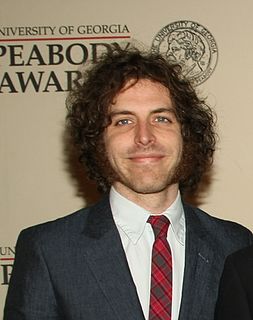A Quote by Matthew Zapruder
It is funny, and also a bit sad, that poets are so often asked to justify our vocation. There seems to be something vaguely mystifying and even hilarious to people about being a poet, especially in these times. Why would anyone choose to do something so...useless?
Related Quotes
One of the surest tests of the superiority or inferiority of a poet is the way in which a poet borrows. Immature poets imitate mature poets steal bad poets deface what they take and good poets make it into something better or at least something different. The good poet welds his theft into a whole of feeling which is unique utterly different than that from which it is torn the bad poet throws it into something which has no cohesion. A good poet will usually borrow from authors remote in time or alien in language or diverse in interest.
Something is funny, most of all, because it's true, and because the velocity of insight into this truth exceeds our normal standards. Something is funny because it's outside our accepted boundary of decorum. Something is funny because it defies our expectations. Something is funny because it offers a temporary reprieve from the hardship of seeing the world as it actually is. Something is funny because it is able to suggest gently that even the worst of our circumstances and sins is subject to eventual mercy.
I figured if I could put together being funny about stuff and actual events, maybe I could do something that wasn't being done much. Because the reporters that I met out there were funny, and they had hilarious stories that just didn't fit in the AP/UPI/New York Times foreign-correspondent style. They couldn't use the things they had. But I could.
Who are you?" Violet asked. It is confusing to fall asleep in the daytime and wake up at night. "what are you doing with Uncle Monty's reptiles?" Klaus asked. It is also confusing to realize you have been sleeping on stairs, rather than in a bed or sleeping bag. "Dixnik?" Sunny asked. It is always confusing why anyone would choose to wear a plaid shirt.
I have always felt a little bit uncomfortable with question [why I'm write these stories]. It's not a question that you would ask a guy that writes detective stories or the guy that writes mystery stories, or westerns, or whatever. But it is asked of the writer of horror stories because it seems that there is something nasty about our love for horror stories, or boogies, ghosts and goblins, demons and devils.
The first complaint we hear from everyone is: 'Why would I want to join this stupid useless thing and know what my brother's eating for lunch?' But that really misses the point because Twitter is fundamentally recipient-controlled - you choose to listen and you choose to leave. But you also choose what to put down and what to share.
Happiness is about what happens to you; and, to an extent, it's dependent on your circumstances, your behaviors, and your attitudes. But the joy of Christ is much, much bigger. The joy of Christ is about relationship with a person. It's something you have access to, but it's also something you must choose. Christian joy shows up not only in the happy times but also in times of trial and discouragement.
I like women, especially beautiful ones. If they have a good face and figure, I would much prefer to watch them being murdered than an ugly girl or man. I certainly don`t have to justify myself to anyone about this. I don`t care what anyone thinks or reads into it. I have often had journalists walk out of interviews when I say what I feel about this subject.
I know that in a poem, even when the speaker is speaking from the poet's experience, there's always something that's borrowed, some authority that sits outside of the poet that the poem has claimed. There's a dramatic pitch that makes the speaker capable of saying something more courageous or stranger or simply other than what the poet would be able to say.
I'm more than a little suspicious of humor in poems, because I think it can at times be a way of getting a reaction out of a reader, or an audience, that is something closer to relief: i.e., thank god this isn't poetry, but stand-up comedy. Some poets are really funny, but more often poets are fourth rate stand up comics at best. But they benefit from the sheer relief of the audience.





































